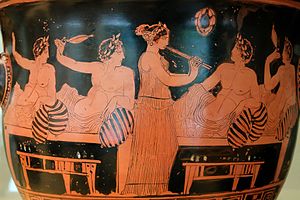

In Ancient Greece, the symposium (‹See Tfd›Greek: συμπόσιον, sympósion or symposio, from συμπίνειν, sympínein, 'to drink together') was the part of a banquet that took place after the meal, when drinking for pleasure was accompanied by music, dancing, recitals, or conversation.[1] Literary works that describe or take place at a symposium include two Socratic dialogues, Plato's Symposium and Xenophon's Symposium, as well as a number of Greek poems, such as the elegies of Theognis of Megara. Symposia are depicted in Greek and Etruscan art, that shows similar scenes.[1]
In modern usage, it has come to mean an academic conference or meeting, such as a scientific conference. The equivalent of a Greek symposium in Roman society is the Latin convivium.[1]